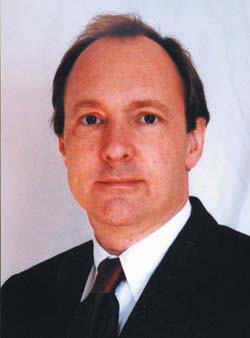Great Thinkers: Einstein, Freud and ... Berners-Lee
Back to Contents of Issue: May 2002
|
|
|
|
by J Mark Lytle |
|
 IT'S A SAFE BET that most J@pan Inc readers have a PC either at home or at work. We're also almost equally sure that the vast majority of you use that peculiar branch of the Internet known as the World Wide Web. No great mystic powers needed to work that one out: 'course you do -- that's what being online is all about these days, right? For such a seemingly nebulous concept as the Web, it's surprising to many that it was actually invented, rather than simply having evolved. The person we have to thank for bringing us the joys of a graphical, point-and-click interface is British scientist Tim
Berners-Lee. IT'S A SAFE BET that most J@pan Inc readers have a PC either at home or at work. We're also almost equally sure that the vast majority of you use that peculiar branch of the Internet known as the World Wide Web. No great mystic powers needed to work that one out: 'course you do -- that's what being online is all about these days, right? For such a seemingly nebulous concept as the Web, it's surprising to many that it was actually invented, rather than simply having evolved. The person we have to thank for bringing us the joys of a graphical, point-and-click interface is British scientist Tim
Berners-Lee.
This April he came to local prominence, as he jetted in to receive the accolades of the Science and Technology Foundation here in Tokyo (and its JPY50 million Japan Award). We won't bore you into submission by telling you what you already know: "The Web makes the world a joined-up place. Where would e-commerce be without it? Et cetera, ad nauseam," but Tim Berners-Lee's personal project, turned global standard, has clearly had a massive impact on how the Western world lives and -- perhaps more significantly -- conducts its business. With a start to life that sounds too good to be true for a future tech genius, Berners-Lee was the product of computer-savvy parents who met while working on the Ferranti Mark I, the first computer to be made available commercially. Further embellishing the high-tech image is the fact that his mother is frequently referred to as the world's first commercial computer programmer. He grew up playing with computer punch tape and building his own 'PCs R Us' mainframes from cardboard boxes. After plumping for physics, "as a compromise between math and electronics; theory and practice," he graduated from Queen's College Oxford in the mid 70s. In 1980, while working at CERN (the European Particle Physics Laboratory) in Geneva as a software engineering consultant, something special happened. He wrote for his own use a program he dubbed Enquire -- its aim being to assist in associating and linking random information on his own computer. Sounds to us like a good starting point for the hypertextual environment that is the Web, which is exactly what it was. His original motivation had been to assist the all-too-frail human memory to get a grip on diverse chunks of knowledge -- once he had Enquire doing just that on his own computer (in the form of linking documents), the next steps were obvious: The leap from personal filing system to global network was as inevitable as the sunrise. By the time 1990 rolled around, he had implemented both the first WWW server and client software, testing the system within CERN before allowing it to begin its rapid spread onto the Internet the following year. The subsequent two years saw a gradual refinement of standards, such as HTTP and HTML, and a growing word-of-mouth following around the world. We all know where that led to. In spite of the ubiquity of his invention, Berners-Lee consistently chose the nonprofit option during the Web's evolution, preferring access for all to cash for himself. The Web-founded riches of other, more famous names provide a telling counterpoint. Time neatly sums up the scale of the achievement: "Unlike so many of the inventions that have moved the world, this one truly was the work of one man. Thomas Edison got credit for the light bulb, but he had dozens of people in his lab working on it. William Shockley may have fathered the transistor, but two of his research scientists actually built it. And if there ever was a thing that was made by committee, the Internet -- with its protocols and packet switching -- is it. But the World Wide Web is Berners-Lee's alone. He designed it. He loosed it on the world. And he more than anyone else has fought to keep it open, nonproprietary and free." Time's last point should not be overlooked; for it, as much as the actual creation of the Web, is Berners-Lee's lasting legacy. In 1994 he founded the World Wide Web Consortium (W3C) at MIT with a view to coordinating the development of the Web and keeping it open for all. W3C's official mission is to "lead the Web to its full potential," which it does by, "developing technologies (specifications, guidelines, software and tools) that will create a forum for information, commerce, inspiration, independent thought and collective understanding." The upshot of this is that the World Wide Web has remained free and based on open standards. @ |
|
Note: The function "email this page" is currently not supported for this page.





